NURS6055 Report: Comprehensive Mental Health Care Plan for Miss A
VerifiedAdded on 2023/01/16
|13
|3612
|57
Report
AI Summary
This report presents a comprehensive mental health care plan for a 26-year-old woman, Miss A, diagnosed with depression and anxiety, stemming from personal and professional stressors. The report includes a clinical formulation identifying symptoms like improper nutrition, sleep disturbances, and social isolation. It outlines a detailed plan of care, emphasizing a comfortable and supportive environment, and prioritizes psycho-education and therapeutic alliances. The psychosocial aspects of care address social isolation through interventions like encouraging connection with family and friends, joining interest and support groups, and addressing nutritional needs and exercise. Specific nursing interventions, including cognitive behavioral therapy (CBT) and interpersonal therapy (IPT), are discussed, along with the importance of family therapy and biological treatments. The report highlights the multifaceted approach to treating depression, emphasizing the integration of psychological, social, and biological interventions to improve Miss A's quality of life. The assignment also incorporates relevant literature to support the care plan and interventions.
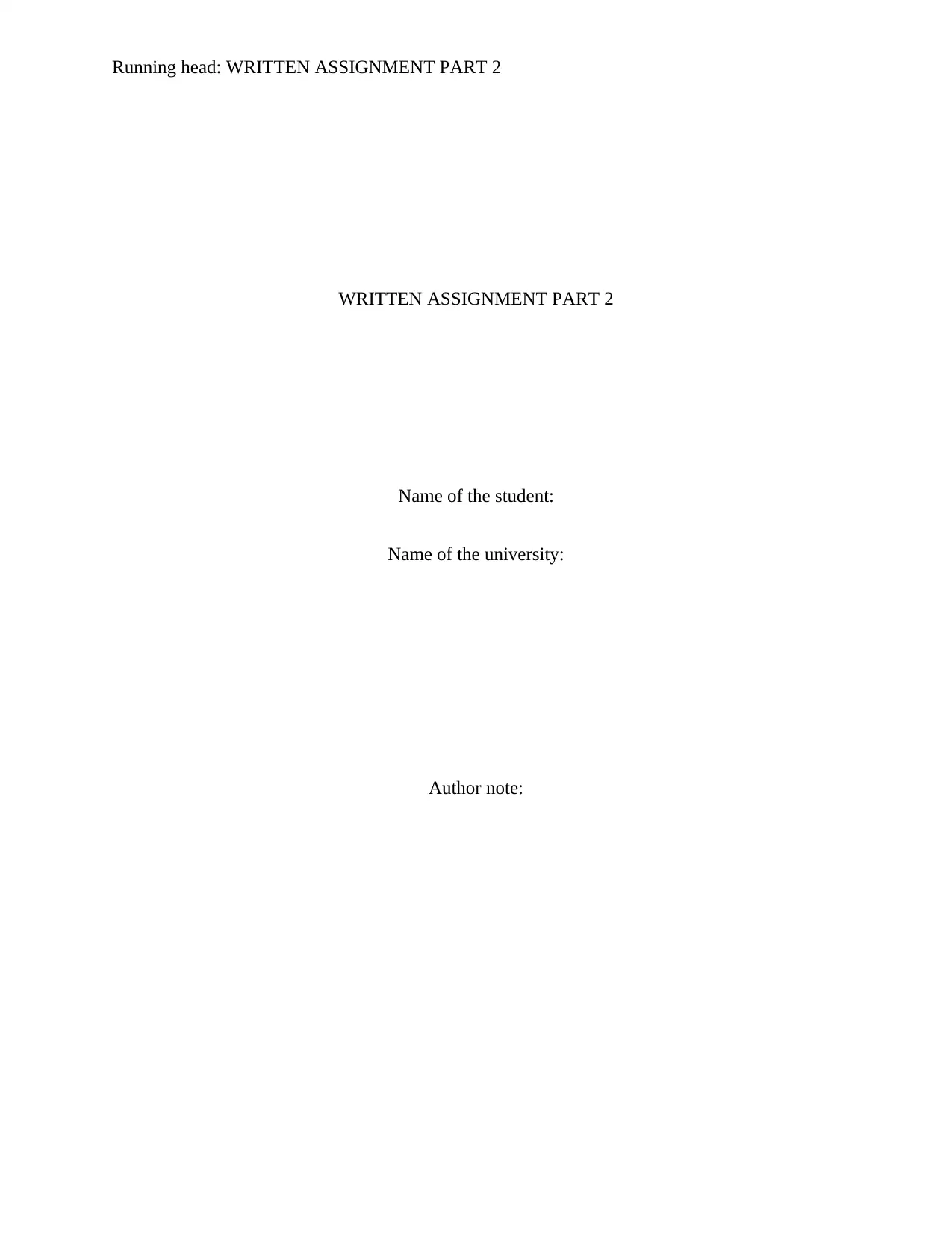
Running head: WRITTEN ASSIGNMENT PART 2
WRITTEN ASSIGNMENT PART 2
Name of the student:
Name of the university:
Author note:
WRITTEN ASSIGNMENT PART 2
Name of the student:
Name of the university:
Author note:
Paraphrase This Document
Need a fresh take? Get an instant paraphrase of this document with our AI Paraphraser
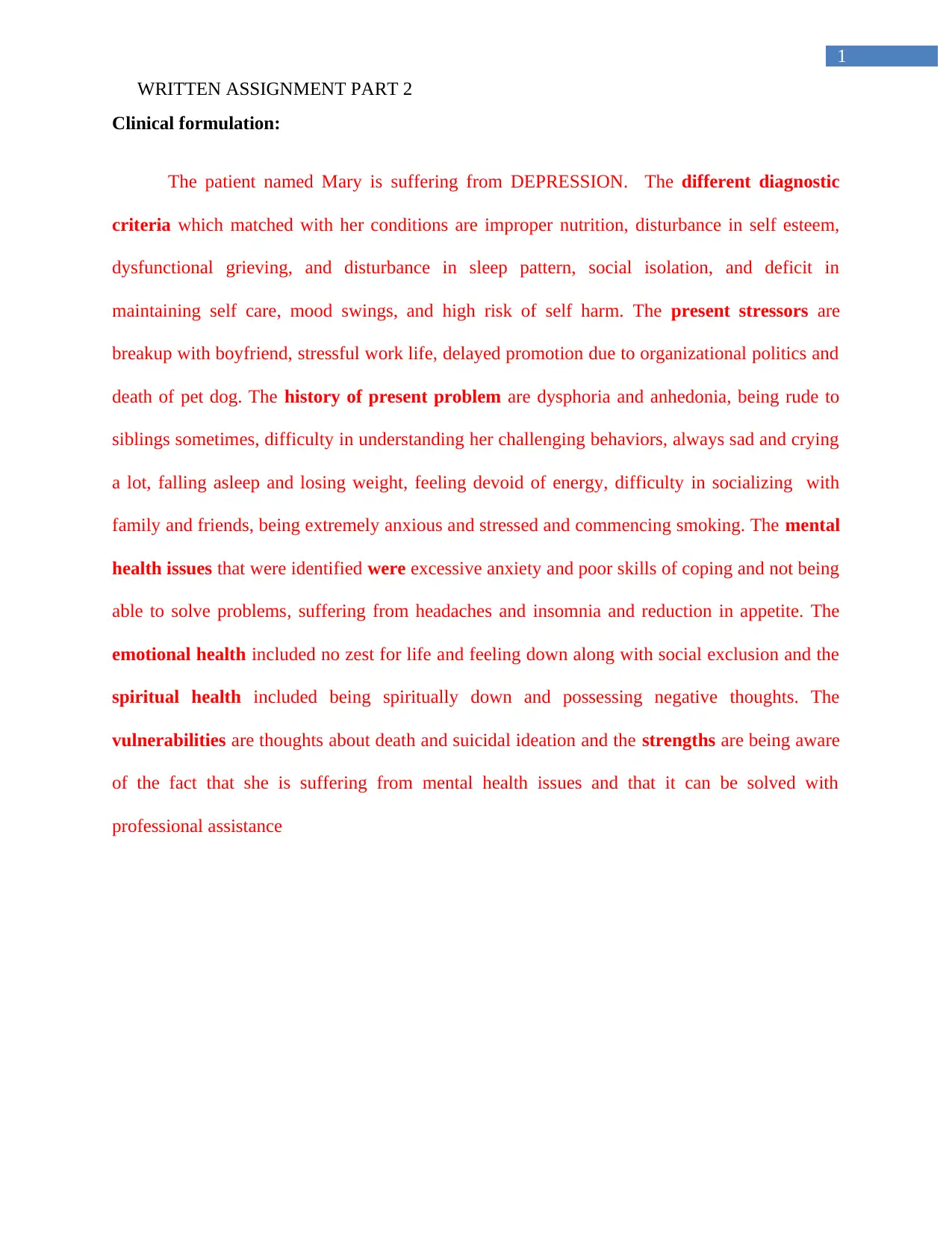
1
WRITTEN ASSIGNMENT PART 2
Clinical formulation:
The patient named Mary is suffering from DEPRESSION. The different diagnostic
criteria which matched with her conditions are improper nutrition, disturbance in self esteem,
dysfunctional grieving, and disturbance in sleep pattern, social isolation, and deficit in
maintaining self care, mood swings, and high risk of self harm. The present stressors are
breakup with boyfriend, stressful work life, delayed promotion due to organizational politics and
death of pet dog. The history of present problem are dysphoria and anhedonia, being rude to
siblings sometimes, difficulty in understanding her challenging behaviors, always sad and crying
a lot, falling asleep and losing weight, feeling devoid of energy, difficulty in socializing with
family and friends, being extremely anxious and stressed and commencing smoking. The mental
health issues that were identified were excessive anxiety and poor skills of coping and not being
able to solve problems, suffering from headaches and insomnia and reduction in appetite. The
emotional health included no zest for life and feeling down along with social exclusion and the
spiritual health included being spiritually down and possessing negative thoughts. The
vulnerabilities are thoughts about death and suicidal ideation and the strengths are being aware
of the fact that she is suffering from mental health issues and that it can be solved with
professional assistance
WRITTEN ASSIGNMENT PART 2
Clinical formulation:
The patient named Mary is suffering from DEPRESSION. The different diagnostic
criteria which matched with her conditions are improper nutrition, disturbance in self esteem,
dysfunctional grieving, and disturbance in sleep pattern, social isolation, and deficit in
maintaining self care, mood swings, and high risk of self harm. The present stressors are
breakup with boyfriend, stressful work life, delayed promotion due to organizational politics and
death of pet dog. The history of present problem are dysphoria and anhedonia, being rude to
siblings sometimes, difficulty in understanding her challenging behaviors, always sad and crying
a lot, falling asleep and losing weight, feeling devoid of energy, difficulty in socializing with
family and friends, being extremely anxious and stressed and commencing smoking. The mental
health issues that were identified were excessive anxiety and poor skills of coping and not being
able to solve problems, suffering from headaches and insomnia and reduction in appetite. The
emotional health included no zest for life and feeling down along with social exclusion and the
spiritual health included being spiritually down and possessing negative thoughts. The
vulnerabilities are thoughts about death and suicidal ideation and the strengths are being aware
of the fact that she is suffering from mental health issues and that it can be solved with
professional assistance
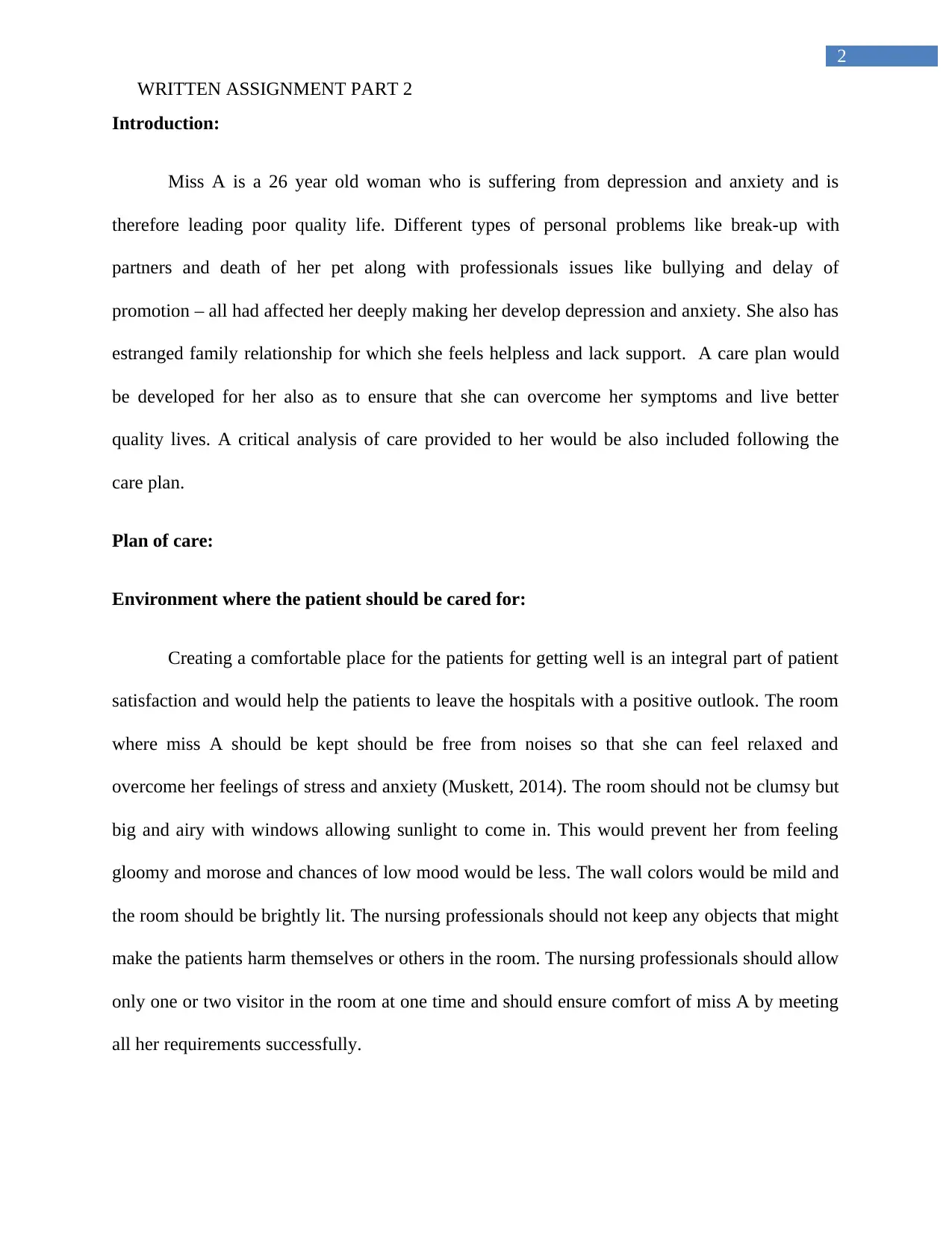
2
WRITTEN ASSIGNMENT PART 2
Introduction:
Miss A is a 26 year old woman who is suffering from depression and anxiety and is
therefore leading poor quality life. Different types of personal problems like break-up with
partners and death of her pet along with professionals issues like bullying and delay of
promotion – all had affected her deeply making her develop depression and anxiety. She also has
estranged family relationship for which she feels helpless and lack support. A care plan would
be developed for her also as to ensure that she can overcome her symptoms and live better
quality lives. A critical analysis of care provided to her would be also included following the
care plan.
Plan of care:
Environment where the patient should be cared for:
Creating a comfortable place for the patients for getting well is an integral part of patient
satisfaction and would help the patients to leave the hospitals with a positive outlook. The room
where miss A should be kept should be free from noises so that she can feel relaxed and
overcome her feelings of stress and anxiety (Muskett, 2014). The room should not be clumsy but
big and airy with windows allowing sunlight to come in. This would prevent her from feeling
gloomy and morose and chances of low mood would be less. The wall colors would be mild and
the room should be brightly lit. The nursing professionals should not keep any objects that might
make the patients harm themselves or others in the room. The nursing professionals should allow
only one or two visitor in the room at one time and should ensure comfort of miss A by meeting
all her requirements successfully.
WRITTEN ASSIGNMENT PART 2
Introduction:
Miss A is a 26 year old woman who is suffering from depression and anxiety and is
therefore leading poor quality life. Different types of personal problems like break-up with
partners and death of her pet along with professionals issues like bullying and delay of
promotion – all had affected her deeply making her develop depression and anxiety. She also has
estranged family relationship for which she feels helpless and lack support. A care plan would
be developed for her also as to ensure that she can overcome her symptoms and live better
quality lives. A critical analysis of care provided to her would be also included following the
care plan.
Plan of care:
Environment where the patient should be cared for:
Creating a comfortable place for the patients for getting well is an integral part of patient
satisfaction and would help the patients to leave the hospitals with a positive outlook. The room
where miss A should be kept should be free from noises so that she can feel relaxed and
overcome her feelings of stress and anxiety (Muskett, 2014). The room should not be clumsy but
big and airy with windows allowing sunlight to come in. This would prevent her from feeling
gloomy and morose and chances of low mood would be less. The wall colors would be mild and
the room should be brightly lit. The nursing professionals should not keep any objects that might
make the patients harm themselves or others in the room. The nursing professionals should allow
only one or two visitor in the room at one time and should ensure comfort of miss A by meeting
all her requirements successfully.
⊘ This is a preview!⊘
Do you want full access?
Subscribe today to unlock all pages.

Trusted by 1+ million students worldwide
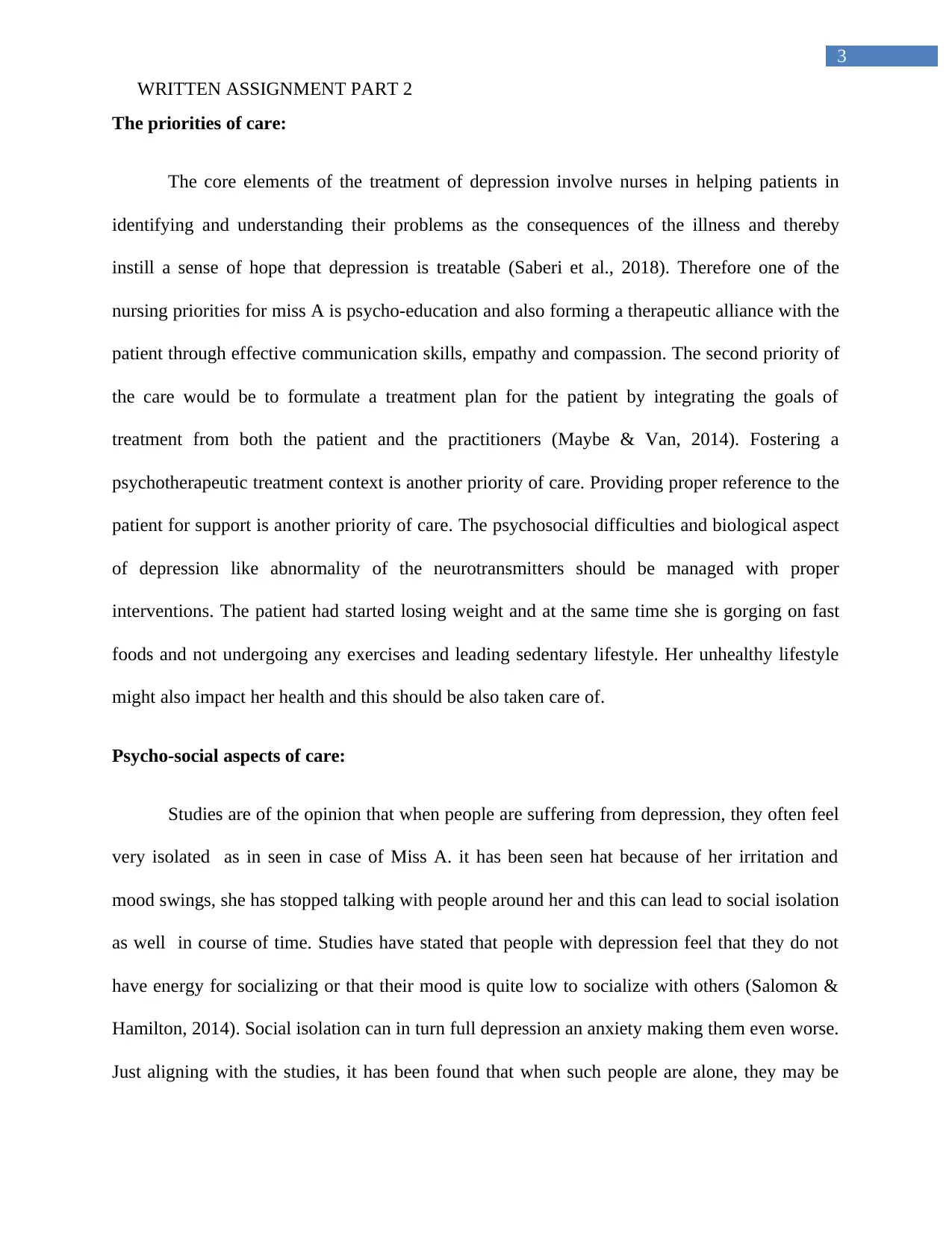
3
WRITTEN ASSIGNMENT PART 2
The priorities of care:
The core elements of the treatment of depression involve nurses in helping patients in
identifying and understanding their problems as the consequences of the illness and thereby
instill a sense of hope that depression is treatable (Saberi et al., 2018). Therefore one of the
nursing priorities for miss A is psycho-education and also forming a therapeutic alliance with the
patient through effective communication skills, empathy and compassion. The second priority of
the care would be to formulate a treatment plan for the patient by integrating the goals of
treatment from both the patient and the practitioners (Maybe & Van, 2014). Fostering a
psychotherapeutic treatment context is another priority of care. Providing proper reference to the
patient for support is another priority of care. The psychosocial difficulties and biological aspect
of depression like abnormality of the neurotransmitters should be managed with proper
interventions. The patient had started losing weight and at the same time she is gorging on fast
foods and not undergoing any exercises and leading sedentary lifestyle. Her unhealthy lifestyle
might also impact her health and this should be also taken care of.
Psycho-social aspects of care:
Studies are of the opinion that when people are suffering from depression, they often feel
very isolated as in seen in case of Miss A. it has been seen hat because of her irritation and
mood swings, she has stopped talking with people around her and this can lead to social isolation
as well in course of time. Studies have stated that people with depression feel that they do not
have energy for socializing or that their mood is quite low to socialize with others (Salomon &
Hamilton, 2014). Social isolation can in turn full depression an anxiety making them even worse.
Just aligning with the studies, it has been found that when such people are alone, they may be
WRITTEN ASSIGNMENT PART 2
The priorities of care:
The core elements of the treatment of depression involve nurses in helping patients in
identifying and understanding their problems as the consequences of the illness and thereby
instill a sense of hope that depression is treatable (Saberi et al., 2018). Therefore one of the
nursing priorities for miss A is psycho-education and also forming a therapeutic alliance with the
patient through effective communication skills, empathy and compassion. The second priority of
the care would be to formulate a treatment plan for the patient by integrating the goals of
treatment from both the patient and the practitioners (Maybe & Van, 2014). Fostering a
psychotherapeutic treatment context is another priority of care. Providing proper reference to the
patient for support is another priority of care. The psychosocial difficulties and biological aspect
of depression like abnormality of the neurotransmitters should be managed with proper
interventions. The patient had started losing weight and at the same time she is gorging on fast
foods and not undergoing any exercises and leading sedentary lifestyle. Her unhealthy lifestyle
might also impact her health and this should be also taken care of.
Psycho-social aspects of care:
Studies are of the opinion that when people are suffering from depression, they often feel
very isolated as in seen in case of Miss A. it has been seen hat because of her irritation and
mood swings, she has stopped talking with people around her and this can lead to social isolation
as well in course of time. Studies have stated that people with depression feel that they do not
have energy for socializing or that their mood is quite low to socialize with others (Salomon &
Hamilton, 2014). Social isolation can in turn full depression an anxiety making them even worse.
Just aligning with the studies, it has been found that when such people are alone, they may be
Paraphrase This Document
Need a fresh take? Get an instant paraphrase of this document with our AI Paraphraser
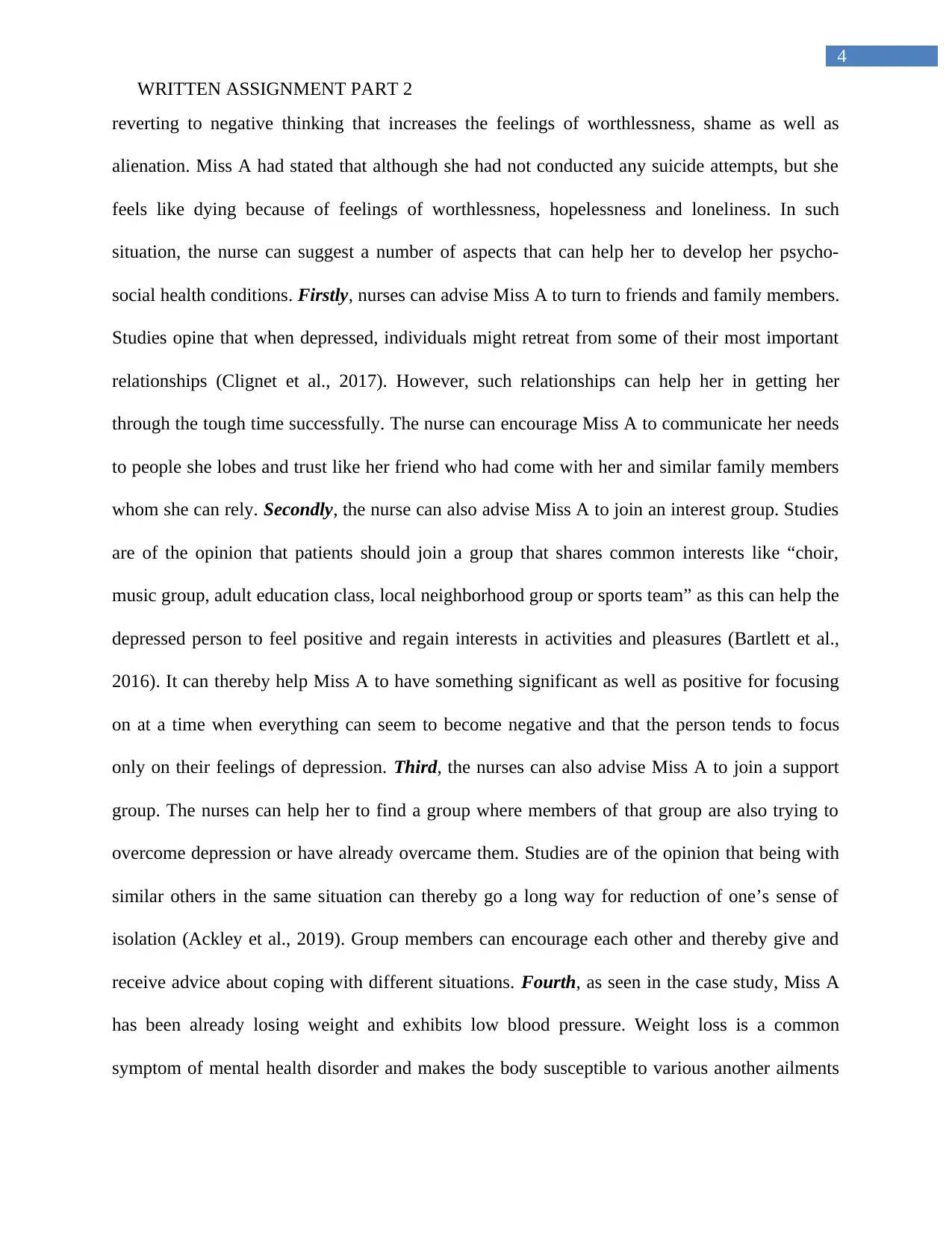
4
WRITTEN ASSIGNMENT PART 2
reverting to negative thinking that increases the feelings of worthlessness, shame as well as
alienation. Miss A had stated that although she had not conducted any suicide attempts, but she
feels like dying because of feelings of worthlessness, hopelessness and loneliness. In such
situation, the nurse can suggest a number of aspects that can help her to develop her psycho-
social health conditions. Firstly, nurses can advise Miss A to turn to friends and family members.
Studies opine that when depressed, individuals might retreat from some of their most important
relationships (Clignet et al., 2017). However, such relationships can help her in getting her
through the tough time successfully. The nurse can encourage Miss A to communicate her needs
to people she lobes and trust like her friend who had come with her and similar family members
whom she can rely. Secondly, the nurse can also advise Miss A to join an interest group. Studies
are of the opinion that patients should join a group that shares common interests like “choir,
music group, adult education class, local neighborhood group or sports team” as this can help the
depressed person to feel positive and regain interests in activities and pleasures (Bartlett et al.,
2016). It can thereby help Miss A to have something significant as well as positive for focusing
on at a time when everything can seem to become negative and that the person tends to focus
only on their feelings of depression. Third, the nurses can also advise Miss A to join a support
group. The nurses can help her to find a group where members of that group are also trying to
overcome depression or have already overcame them. Studies are of the opinion that being with
similar others in the same situation can thereby go a long way for reduction of one’s sense of
isolation (Ackley et al., 2019). Group members can encourage each other and thereby give and
receive advice about coping with different situations. Fourth, as seen in the case study, Miss A
has been already losing weight and exhibits low blood pressure. Weight loss is a common
symptom of mental health disorder and makes the body susceptible to various another ailments
WRITTEN ASSIGNMENT PART 2
reverting to negative thinking that increases the feelings of worthlessness, shame as well as
alienation. Miss A had stated that although she had not conducted any suicide attempts, but she
feels like dying because of feelings of worthlessness, hopelessness and loneliness. In such
situation, the nurse can suggest a number of aspects that can help her to develop her psycho-
social health conditions. Firstly, nurses can advise Miss A to turn to friends and family members.
Studies opine that when depressed, individuals might retreat from some of their most important
relationships (Clignet et al., 2017). However, such relationships can help her in getting her
through the tough time successfully. The nurse can encourage Miss A to communicate her needs
to people she lobes and trust like her friend who had come with her and similar family members
whom she can rely. Secondly, the nurse can also advise Miss A to join an interest group. Studies
are of the opinion that patients should join a group that shares common interests like “choir,
music group, adult education class, local neighborhood group or sports team” as this can help the
depressed person to feel positive and regain interests in activities and pleasures (Bartlett et al.,
2016). It can thereby help Miss A to have something significant as well as positive for focusing
on at a time when everything can seem to become negative and that the person tends to focus
only on their feelings of depression. Third, the nurses can also advise Miss A to join a support
group. The nurses can help her to find a group where members of that group are also trying to
overcome depression or have already overcame them. Studies are of the opinion that being with
similar others in the same situation can thereby go a long way for reduction of one’s sense of
isolation (Ackley et al., 2019). Group members can encourage each other and thereby give and
receive advice about coping with different situations. Fourth, as seen in the case study, Miss A
has been already losing weight and exhibits low blood pressure. Weight loss is a common
symptom of mental health disorder and makes the body susceptible to various another ailments
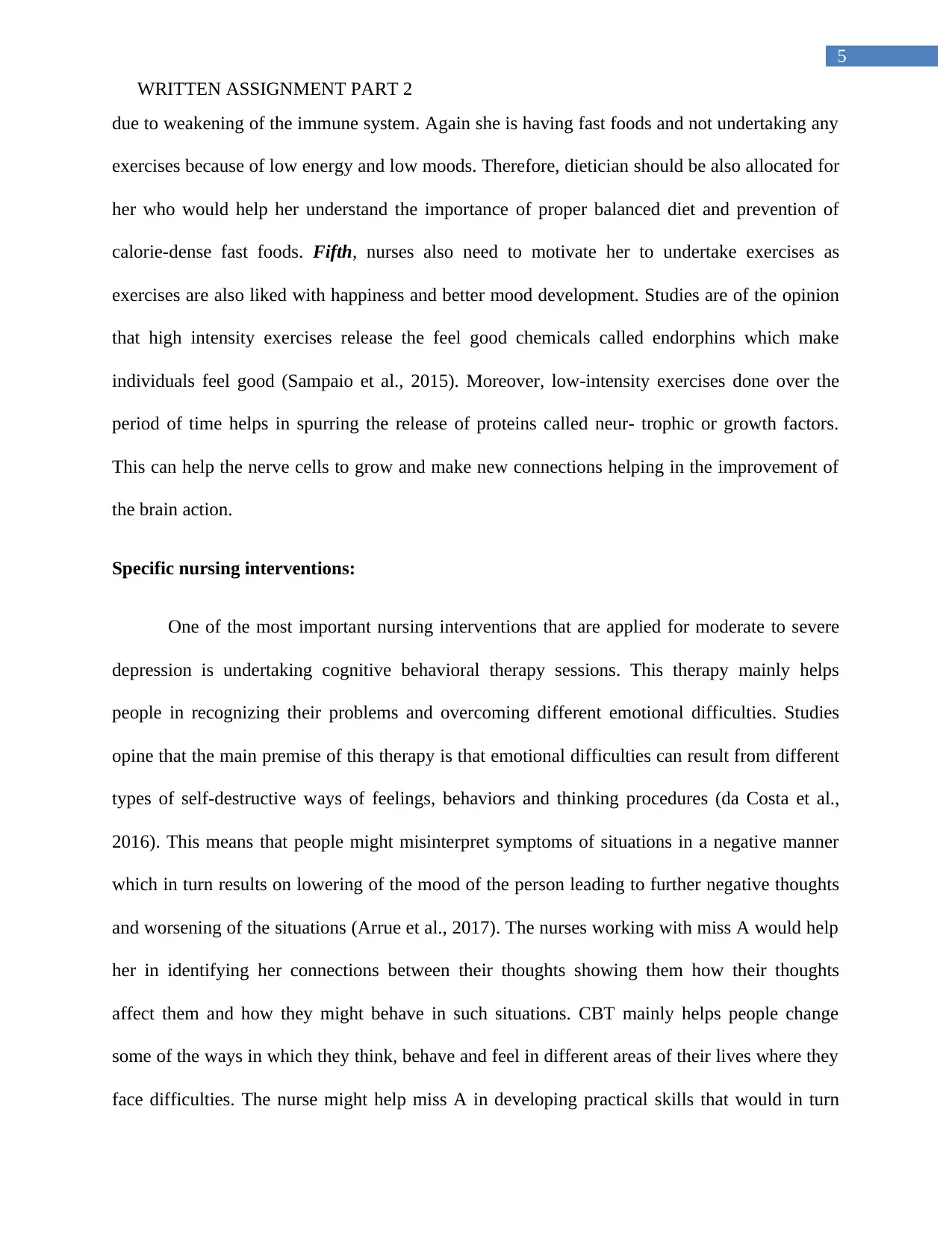
5
WRITTEN ASSIGNMENT PART 2
due to weakening of the immune system. Again she is having fast foods and not undertaking any
exercises because of low energy and low moods. Therefore, dietician should be also allocated for
her who would help her understand the importance of proper balanced diet and prevention of
calorie-dense fast foods. Fifth, nurses also need to motivate her to undertake exercises as
exercises are also liked with happiness and better mood development. Studies are of the opinion
that high intensity exercises release the feel good chemicals called endorphins which make
individuals feel good (Sampaio et al., 2015). Moreover, low-intensity exercises done over the
period of time helps in spurring the release of proteins called neur- trophic or growth factors.
This can help the nerve cells to grow and make new connections helping in the improvement of
the brain action.
Specific nursing interventions:
One of the most important nursing interventions that are applied for moderate to severe
depression is undertaking cognitive behavioral therapy sessions. This therapy mainly helps
people in recognizing their problems and overcoming different emotional difficulties. Studies
opine that the main premise of this therapy is that emotional difficulties can result from different
types of self-destructive ways of feelings, behaviors and thinking procedures (da Costa et al.,
2016). This means that people might misinterpret symptoms of situations in a negative manner
which in turn results on lowering of the mood of the person leading to further negative thoughts
and worsening of the situations (Arrue et al., 2017). The nurses working with miss A would help
her in identifying her connections between their thoughts showing them how their thoughts
affect them and how they might behave in such situations. CBT mainly helps people change
some of the ways in which they think, behave and feel in different areas of their lives where they
face difficulties. The nurse might help miss A in developing practical skills that would in turn
WRITTEN ASSIGNMENT PART 2
due to weakening of the immune system. Again she is having fast foods and not undertaking any
exercises because of low energy and low moods. Therefore, dietician should be also allocated for
her who would help her understand the importance of proper balanced diet and prevention of
calorie-dense fast foods. Fifth, nurses also need to motivate her to undertake exercises as
exercises are also liked with happiness and better mood development. Studies are of the opinion
that high intensity exercises release the feel good chemicals called endorphins which make
individuals feel good (Sampaio et al., 2015). Moreover, low-intensity exercises done over the
period of time helps in spurring the release of proteins called neur- trophic or growth factors.
This can help the nerve cells to grow and make new connections helping in the improvement of
the brain action.
Specific nursing interventions:
One of the most important nursing interventions that are applied for moderate to severe
depression is undertaking cognitive behavioral therapy sessions. This therapy mainly helps
people in recognizing their problems and overcoming different emotional difficulties. Studies
opine that the main premise of this therapy is that emotional difficulties can result from different
types of self-destructive ways of feelings, behaviors and thinking procedures (da Costa et al.,
2016). This means that people might misinterpret symptoms of situations in a negative manner
which in turn results on lowering of the mood of the person leading to further negative thoughts
and worsening of the situations (Arrue et al., 2017). The nurses working with miss A would help
her in identifying her connections between their thoughts showing them how their thoughts
affect them and how they might behave in such situations. CBT mainly helps people change
some of the ways in which they think, behave and feel in different areas of their lives where they
face difficulties. The nurse might help miss A in developing practical skills that would in turn
⊘ This is a preview!⊘
Do you want full access?
Subscribe today to unlock all pages.

Trusted by 1+ million students worldwide
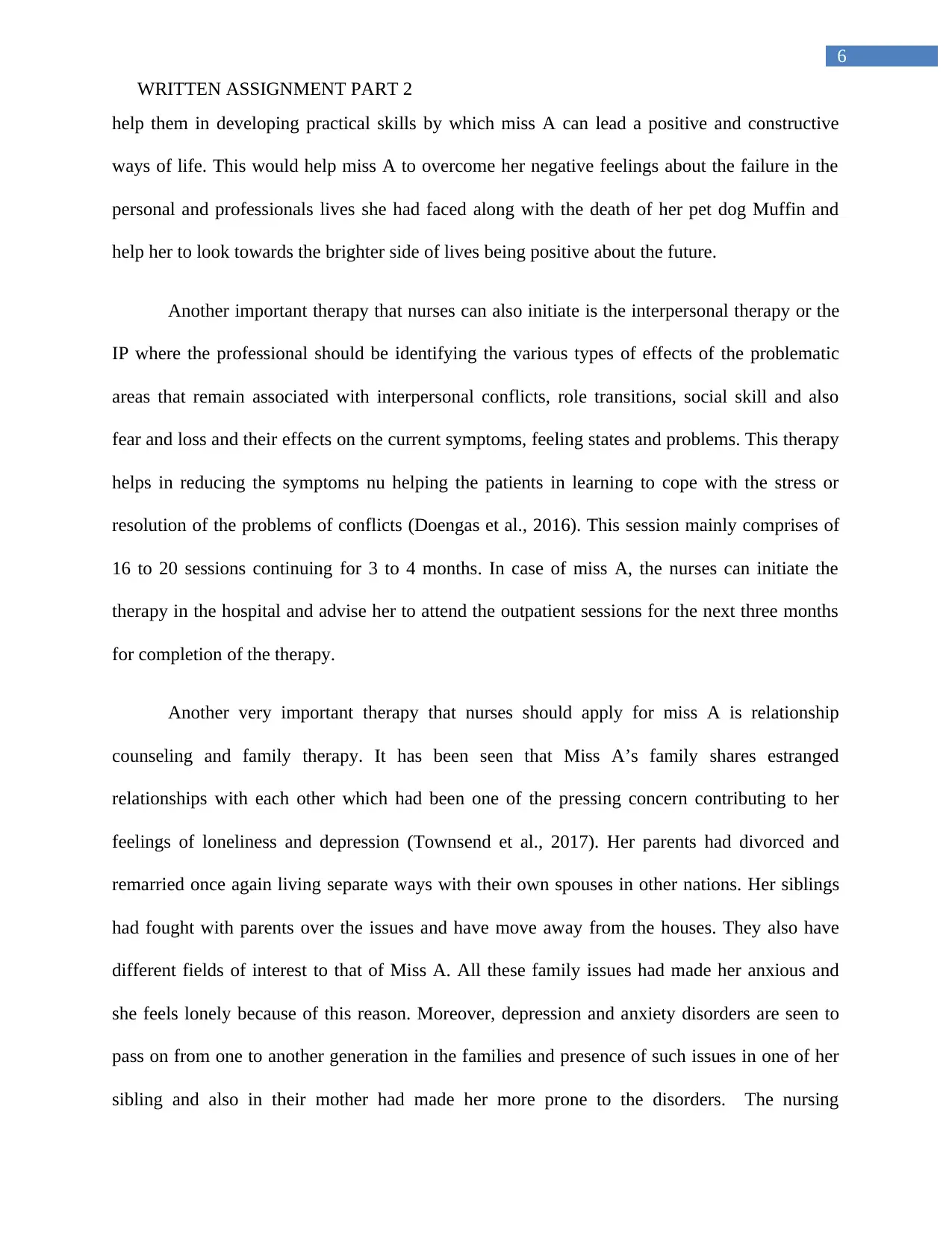
6
WRITTEN ASSIGNMENT PART 2
help them in developing practical skills by which miss A can lead a positive and constructive
ways of life. This would help miss A to overcome her negative feelings about the failure in the
personal and professionals lives she had faced along with the death of her pet dog Muffin and
help her to look towards the brighter side of lives being positive about the future.
Another important therapy that nurses can also initiate is the interpersonal therapy or the
IP where the professional should be identifying the various types of effects of the problematic
areas that remain associated with interpersonal conflicts, role transitions, social skill and also
fear and loss and their effects on the current symptoms, feeling states and problems. This therapy
helps in reducing the symptoms nu helping the patients in learning to cope with the stress or
resolution of the problems of conflicts (Doengas et al., 2016). This session mainly comprises of
16 to 20 sessions continuing for 3 to 4 months. In case of miss A, the nurses can initiate the
therapy in the hospital and advise her to attend the outpatient sessions for the next three months
for completion of the therapy.
Another very important therapy that nurses should apply for miss A is relationship
counseling and family therapy. It has been seen that Miss A’s family shares estranged
relationships with each other which had been one of the pressing concern contributing to her
feelings of loneliness and depression (Townsend et al., 2017). Her parents had divorced and
remarried once again living separate ways with their own spouses in other nations. Her siblings
had fought with parents over the issues and have move away from the houses. They also have
different fields of interest to that of Miss A. All these family issues had made her anxious and
she feels lonely because of this reason. Moreover, depression and anxiety disorders are seen to
pass on from one to another generation in the families and presence of such issues in one of her
sibling and also in their mother had made her more prone to the disorders. The nursing
WRITTEN ASSIGNMENT PART 2
help them in developing practical skills by which miss A can lead a positive and constructive
ways of life. This would help miss A to overcome her negative feelings about the failure in the
personal and professionals lives she had faced along with the death of her pet dog Muffin and
help her to look towards the brighter side of lives being positive about the future.
Another important therapy that nurses can also initiate is the interpersonal therapy or the
IP where the professional should be identifying the various types of effects of the problematic
areas that remain associated with interpersonal conflicts, role transitions, social skill and also
fear and loss and their effects on the current symptoms, feeling states and problems. This therapy
helps in reducing the symptoms nu helping the patients in learning to cope with the stress or
resolution of the problems of conflicts (Doengas et al., 2016). This session mainly comprises of
16 to 20 sessions continuing for 3 to 4 months. In case of miss A, the nurses can initiate the
therapy in the hospital and advise her to attend the outpatient sessions for the next three months
for completion of the therapy.
Another very important therapy that nurses should apply for miss A is relationship
counseling and family therapy. It has been seen that Miss A’s family shares estranged
relationships with each other which had been one of the pressing concern contributing to her
feelings of loneliness and depression (Townsend et al., 2017). Her parents had divorced and
remarried once again living separate ways with their own spouses in other nations. Her siblings
had fought with parents over the issues and have move away from the houses. They also have
different fields of interest to that of Miss A. All these family issues had made her anxious and
she feels lonely because of this reason. Moreover, depression and anxiety disorders are seen to
pass on from one to another generation in the families and presence of such issues in one of her
sibling and also in their mother had made her more prone to the disorders. The nursing
Paraphrase This Document
Need a fresh take? Get an instant paraphrase of this document with our AI Paraphraser
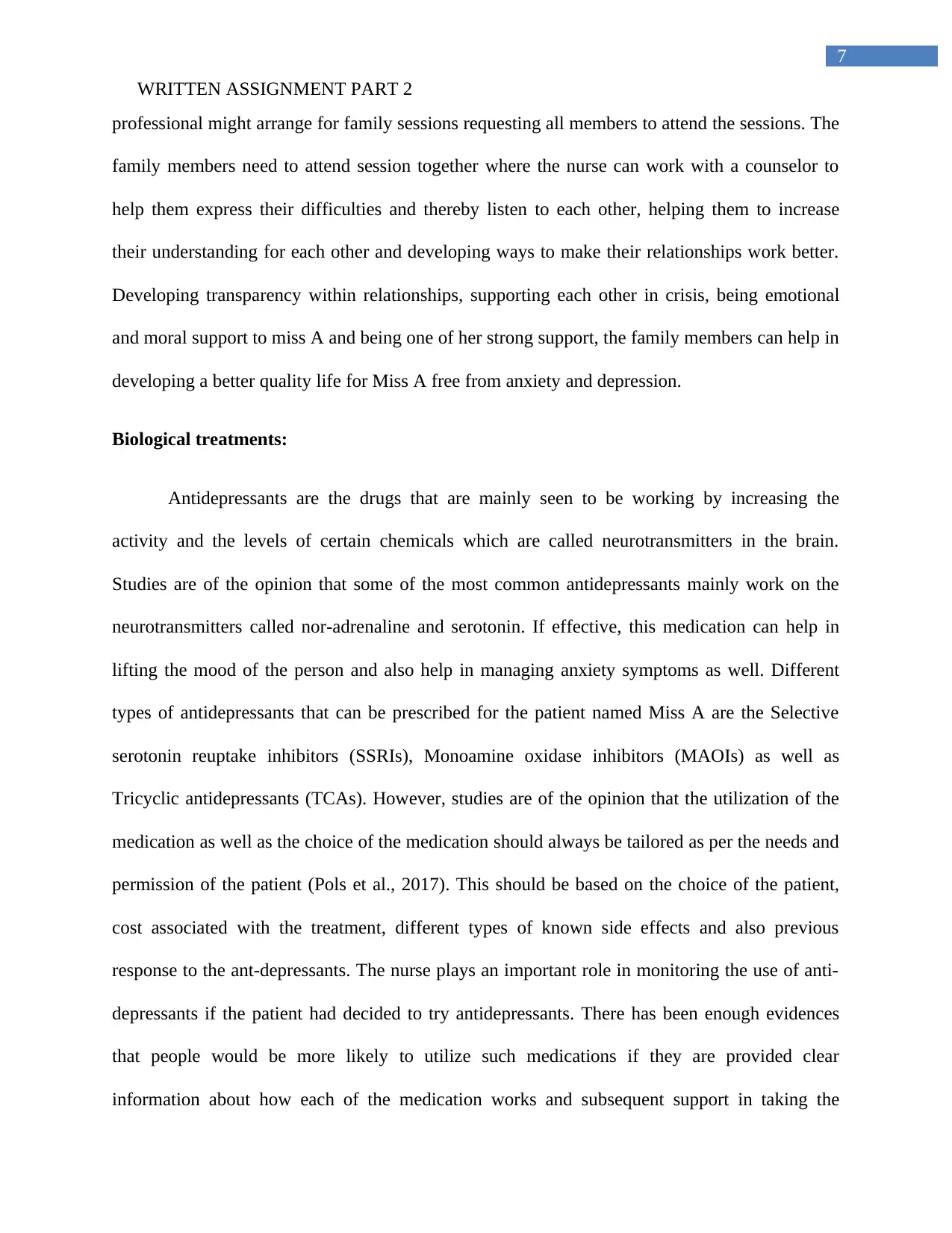
7
WRITTEN ASSIGNMENT PART 2
professional might arrange for family sessions requesting all members to attend the sessions. The
family members need to attend session together where the nurse can work with a counselor to
help them express their difficulties and thereby listen to each other, helping them to increase
their understanding for each other and developing ways to make their relationships work better.
Developing transparency within relationships, supporting each other in crisis, being emotional
and moral support to miss A and being one of her strong support, the family members can help in
developing a better quality life for Miss A free from anxiety and depression.
Biological treatments:
Antidepressants are the drugs that are mainly seen to be working by increasing the
activity and the levels of certain chemicals which are called neurotransmitters in the brain.
Studies are of the opinion that some of the most common antidepressants mainly work on the
neurotransmitters called nor-adrenaline and serotonin. If effective, this medication can help in
lifting the mood of the person and also help in managing anxiety symptoms as well. Different
types of antidepressants that can be prescribed for the patient named Miss A are the Selective
serotonin reuptake inhibitors (SSRIs), Monoamine oxidase inhibitors (MAOIs) as well as
Tricyclic antidepressants (TCAs). However, studies are of the opinion that the utilization of the
medication as well as the choice of the medication should always be tailored as per the needs and
permission of the patient (Pols et al., 2017). This should be based on the choice of the patient,
cost associated with the treatment, different types of known side effects and also previous
response to the ant-depressants. The nurse plays an important role in monitoring the use of anti-
depressants if the patient had decided to try antidepressants. There has been enough evidences
that people would be more likely to utilize such medications if they are provided clear
information about how each of the medication works and subsequent support in taking the
WRITTEN ASSIGNMENT PART 2
professional might arrange for family sessions requesting all members to attend the sessions. The
family members need to attend session together where the nurse can work with a counselor to
help them express their difficulties and thereby listen to each other, helping them to increase
their understanding for each other and developing ways to make their relationships work better.
Developing transparency within relationships, supporting each other in crisis, being emotional
and moral support to miss A and being one of her strong support, the family members can help in
developing a better quality life for Miss A free from anxiety and depression.
Biological treatments:
Antidepressants are the drugs that are mainly seen to be working by increasing the
activity and the levels of certain chemicals which are called neurotransmitters in the brain.
Studies are of the opinion that some of the most common antidepressants mainly work on the
neurotransmitters called nor-adrenaline and serotonin. If effective, this medication can help in
lifting the mood of the person and also help in managing anxiety symptoms as well. Different
types of antidepressants that can be prescribed for the patient named Miss A are the Selective
serotonin reuptake inhibitors (SSRIs), Monoamine oxidase inhibitors (MAOIs) as well as
Tricyclic antidepressants (TCAs). However, studies are of the opinion that the utilization of the
medication as well as the choice of the medication should always be tailored as per the needs and
permission of the patient (Pols et al., 2017). This should be based on the choice of the patient,
cost associated with the treatment, different types of known side effects and also previous
response to the ant-depressants. The nurse plays an important role in monitoring the use of anti-
depressants if the patient had decided to try antidepressants. There has been enough evidences
that people would be more likely to utilize such medications if they are provided clear
information about how each of the medication works and subsequent support in taking the
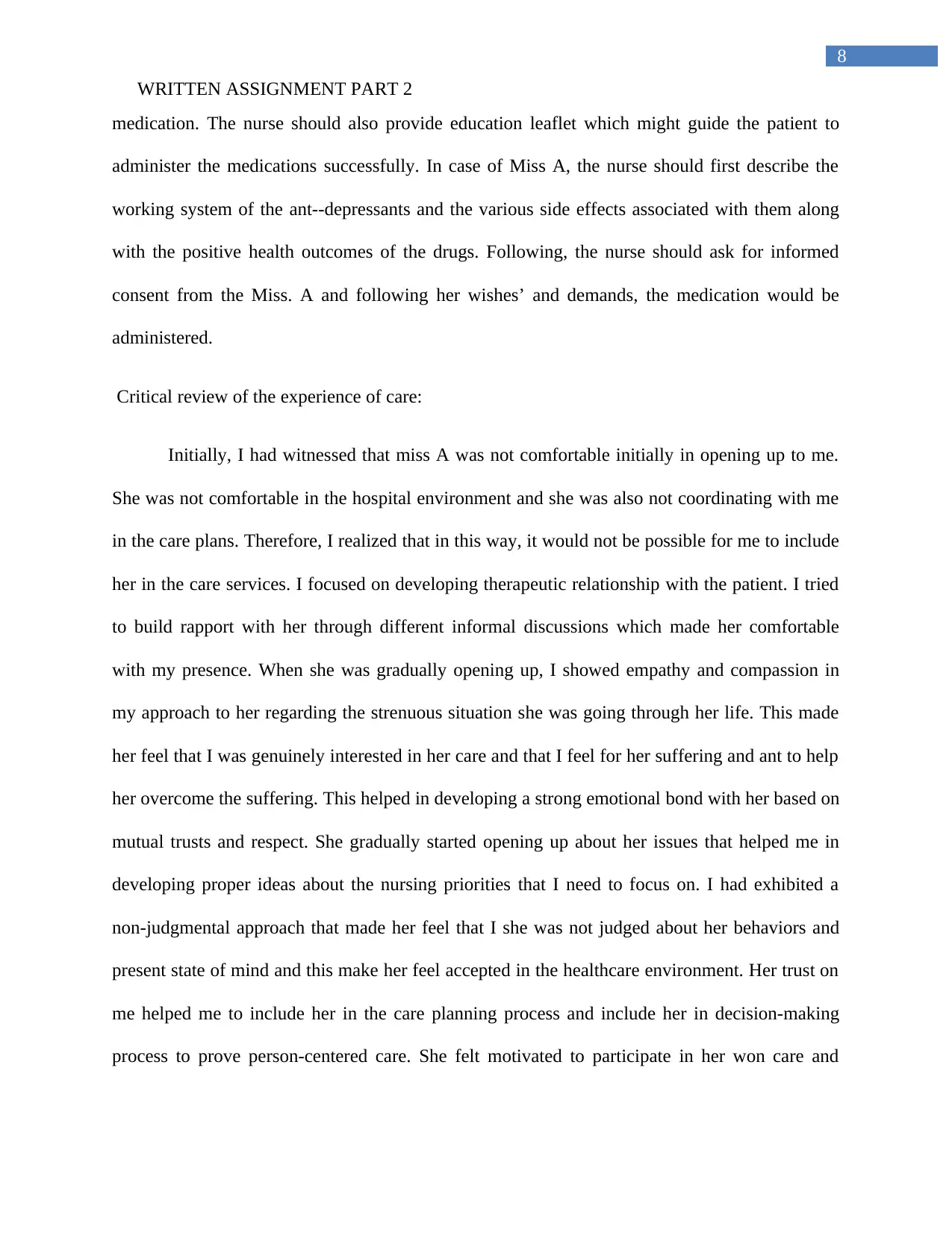
8
WRITTEN ASSIGNMENT PART 2
medication. The nurse should also provide education leaflet which might guide the patient to
administer the medications successfully. In case of Miss A, the nurse should first describe the
working system of the ant--depressants and the various side effects associated with them along
with the positive health outcomes of the drugs. Following, the nurse should ask for informed
consent from the Miss. A and following her wishes’ and demands, the medication would be
administered.
Critical review of the experience of care:
Initially, I had witnessed that miss A was not comfortable initially in opening up to me.
She was not comfortable in the hospital environment and she was also not coordinating with me
in the care plans. Therefore, I realized that in this way, it would not be possible for me to include
her in the care services. I focused on developing therapeutic relationship with the patient. I tried
to build rapport with her through different informal discussions which made her comfortable
with my presence. When she was gradually opening up, I showed empathy and compassion in
my approach to her regarding the strenuous situation she was going through her life. This made
her feel that I was genuinely interested in her care and that I feel for her suffering and ant to help
her overcome the suffering. This helped in developing a strong emotional bond with her based on
mutual trusts and respect. She gradually started opening up about her issues that helped me in
developing proper ideas about the nursing priorities that I need to focus on. I had exhibited a
non-judgmental approach that made her feel that I she was not judged about her behaviors and
present state of mind and this make her feel accepted in the healthcare environment. Her trust on
me helped me to include her in the care planning process and include her in decision-making
process to prove person-centered care. She felt motivated to participate in her won care and
WRITTEN ASSIGNMENT PART 2
medication. The nurse should also provide education leaflet which might guide the patient to
administer the medications successfully. In case of Miss A, the nurse should first describe the
working system of the ant--depressants and the various side effects associated with them along
with the positive health outcomes of the drugs. Following, the nurse should ask for informed
consent from the Miss. A and following her wishes’ and demands, the medication would be
administered.
Critical review of the experience of care:
Initially, I had witnessed that miss A was not comfortable initially in opening up to me.
She was not comfortable in the hospital environment and she was also not coordinating with me
in the care plans. Therefore, I realized that in this way, it would not be possible for me to include
her in the care services. I focused on developing therapeutic relationship with the patient. I tried
to build rapport with her through different informal discussions which made her comfortable
with my presence. When she was gradually opening up, I showed empathy and compassion in
my approach to her regarding the strenuous situation she was going through her life. This made
her feel that I was genuinely interested in her care and that I feel for her suffering and ant to help
her overcome the suffering. This helped in developing a strong emotional bond with her based on
mutual trusts and respect. She gradually started opening up about her issues that helped me in
developing proper ideas about the nursing priorities that I need to focus on. I had exhibited a
non-judgmental approach that made her feel that I she was not judged about her behaviors and
present state of mind and this make her feel accepted in the healthcare environment. Her trust on
me helped me to include her in the care planning process and include her in decision-making
process to prove person-centered care. She felt motivated to participate in her won care and
⊘ This is a preview!⊘
Do you want full access?
Subscribe today to unlock all pages.

Trusted by 1+ million students worldwide
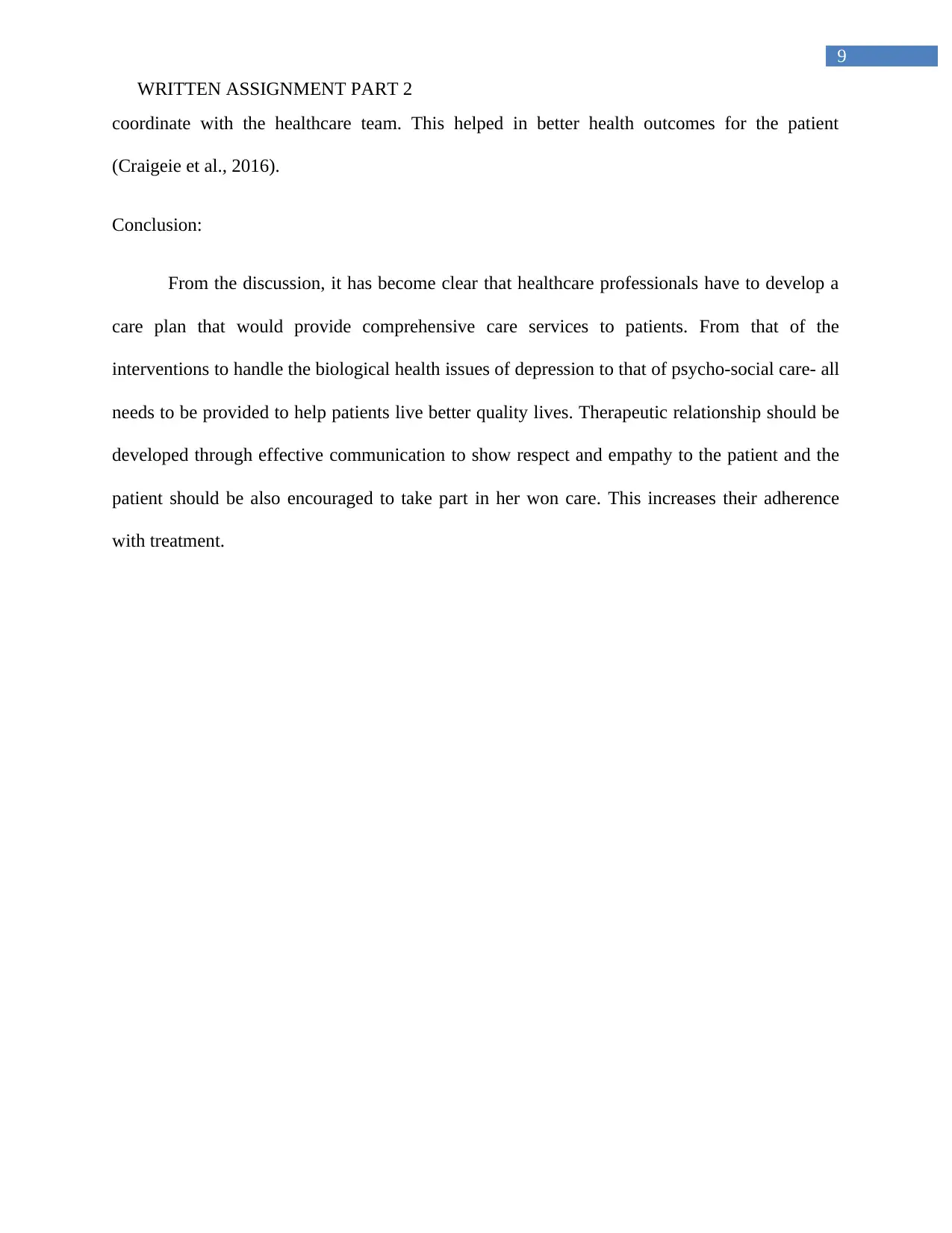
9
WRITTEN ASSIGNMENT PART 2
coordinate with the healthcare team. This helped in better health outcomes for the patient
(Craigeie et al., 2016).
Conclusion:
From the discussion, it has become clear that healthcare professionals have to develop a
care plan that would provide comprehensive care services to patients. From that of the
interventions to handle the biological health issues of depression to that of psycho-social care- all
needs to be provided to help patients live better quality lives. Therapeutic relationship should be
developed through effective communication to show respect and empathy to the patient and the
patient should be also encouraged to take part in her won care. This increases their adherence
with treatment.
WRITTEN ASSIGNMENT PART 2
coordinate with the healthcare team. This helped in better health outcomes for the patient
(Craigeie et al., 2016).
Conclusion:
From the discussion, it has become clear that healthcare professionals have to develop a
care plan that would provide comprehensive care services to patients. From that of the
interventions to handle the biological health issues of depression to that of psycho-social care- all
needs to be provided to help patients live better quality lives. Therapeutic relationship should be
developed through effective communication to show respect and empathy to the patient and the
patient should be also encouraged to take part in her won care. This increases their adherence
with treatment.
Paraphrase This Document
Need a fresh take? Get an instant paraphrase of this document with our AI Paraphraser
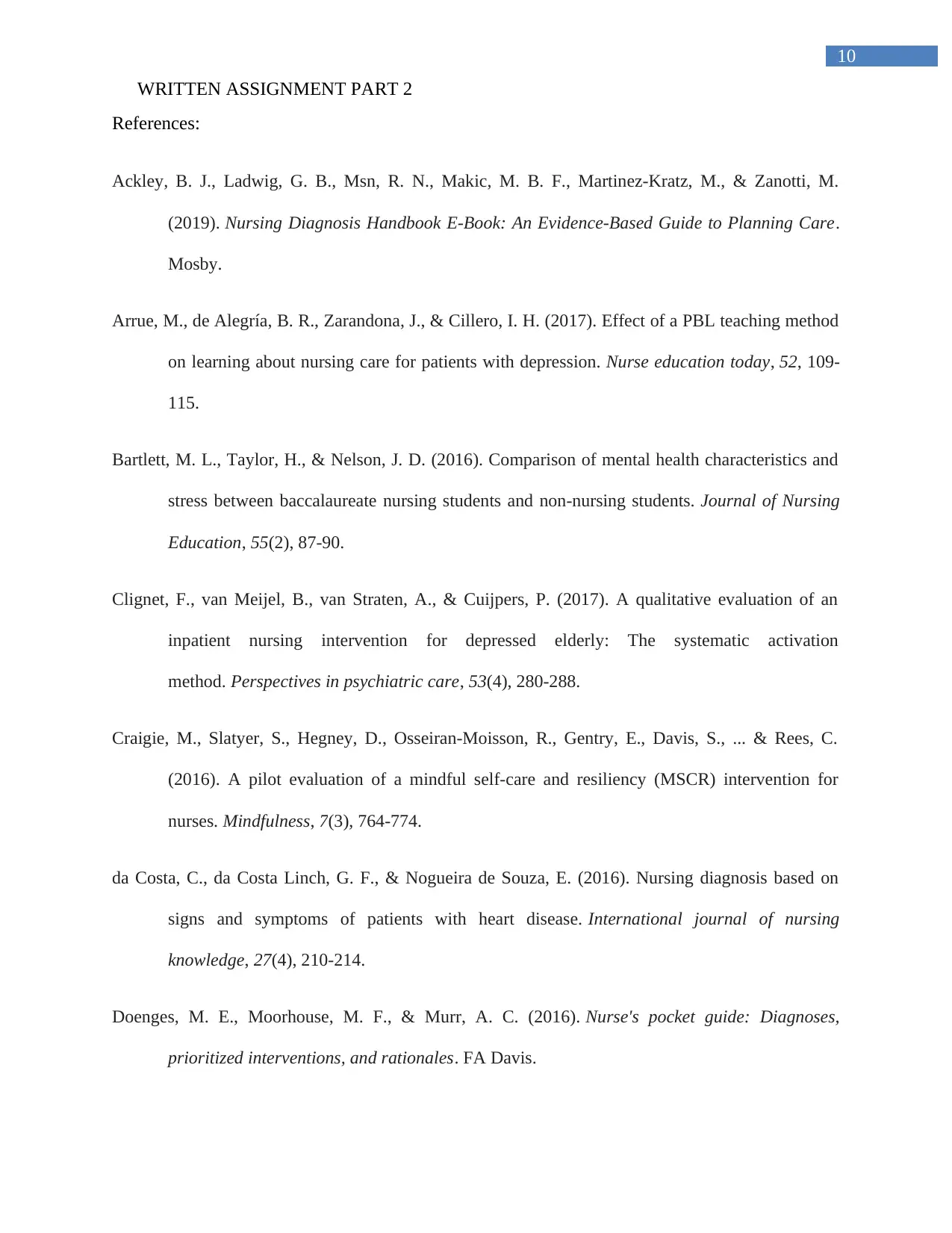
10
WRITTEN ASSIGNMENT PART 2
References:
Ackley, B. J., Ladwig, G. B., Msn, R. N., Makic, M. B. F., Martinez-Kratz, M., & Zanotti, M.
(2019). Nursing Diagnosis Handbook E-Book: An Evidence-Based Guide to Planning Care.
Mosby.
Arrue, M., de Alegría, B. R., Zarandona, J., & Cillero, I. H. (2017). Effect of a PBL teaching method
on learning about nursing care for patients with depression. Nurse education today, 52, 109-
115.
Bartlett, M. L., Taylor, H., & Nelson, J. D. (2016). Comparison of mental health characteristics and
stress between baccalaureate nursing students and non-nursing students. Journal of Nursing
Education, 55(2), 87-90.
Clignet, F., van Meijel, B., van Straten, A., & Cuijpers, P. (2017). A qualitative evaluation of an
inpatient nursing intervention for depressed elderly: The systematic activation
method. Perspectives in psychiatric care, 53(4), 280-288.
Craigie, M., Slatyer, S., Hegney, D., Osseiran-Moisson, R., Gentry, E., Davis, S., ... & Rees, C.
(2016). A pilot evaluation of a mindful self-care and resiliency (MSCR) intervention for
nurses. Mindfulness, 7(3), 764-774.
da Costa, C., da Costa Linch, G. F., & Nogueira de Souza, E. (2016). Nursing diagnosis based on
signs and symptoms of patients with heart disease. International journal of nursing
knowledge, 27(4), 210-214.
Doenges, M. E., Moorhouse, M. F., & Murr, A. C. (2016). Nurse's pocket guide: Diagnoses,
prioritized interventions, and rationales. FA Davis.
WRITTEN ASSIGNMENT PART 2
References:
Ackley, B. J., Ladwig, G. B., Msn, R. N., Makic, M. B. F., Martinez-Kratz, M., & Zanotti, M.
(2019). Nursing Diagnosis Handbook E-Book: An Evidence-Based Guide to Planning Care.
Mosby.
Arrue, M., de Alegría, B. R., Zarandona, J., & Cillero, I. H. (2017). Effect of a PBL teaching method
on learning about nursing care for patients with depression. Nurse education today, 52, 109-
115.
Bartlett, M. L., Taylor, H., & Nelson, J. D. (2016). Comparison of mental health characteristics and
stress between baccalaureate nursing students and non-nursing students. Journal of Nursing
Education, 55(2), 87-90.
Clignet, F., van Meijel, B., van Straten, A., & Cuijpers, P. (2017). A qualitative evaluation of an
inpatient nursing intervention for depressed elderly: The systematic activation
method. Perspectives in psychiatric care, 53(4), 280-288.
Craigie, M., Slatyer, S., Hegney, D., Osseiran-Moisson, R., Gentry, E., Davis, S., ... & Rees, C.
(2016). A pilot evaluation of a mindful self-care and resiliency (MSCR) intervention for
nurses. Mindfulness, 7(3), 764-774.
da Costa, C., da Costa Linch, G. F., & Nogueira de Souza, E. (2016). Nursing diagnosis based on
signs and symptoms of patients with heart disease. International journal of nursing
knowledge, 27(4), 210-214.
Doenges, M. E., Moorhouse, M. F., & Murr, A. C. (2016). Nurse's pocket guide: Diagnoses,
prioritized interventions, and rationales. FA Davis.
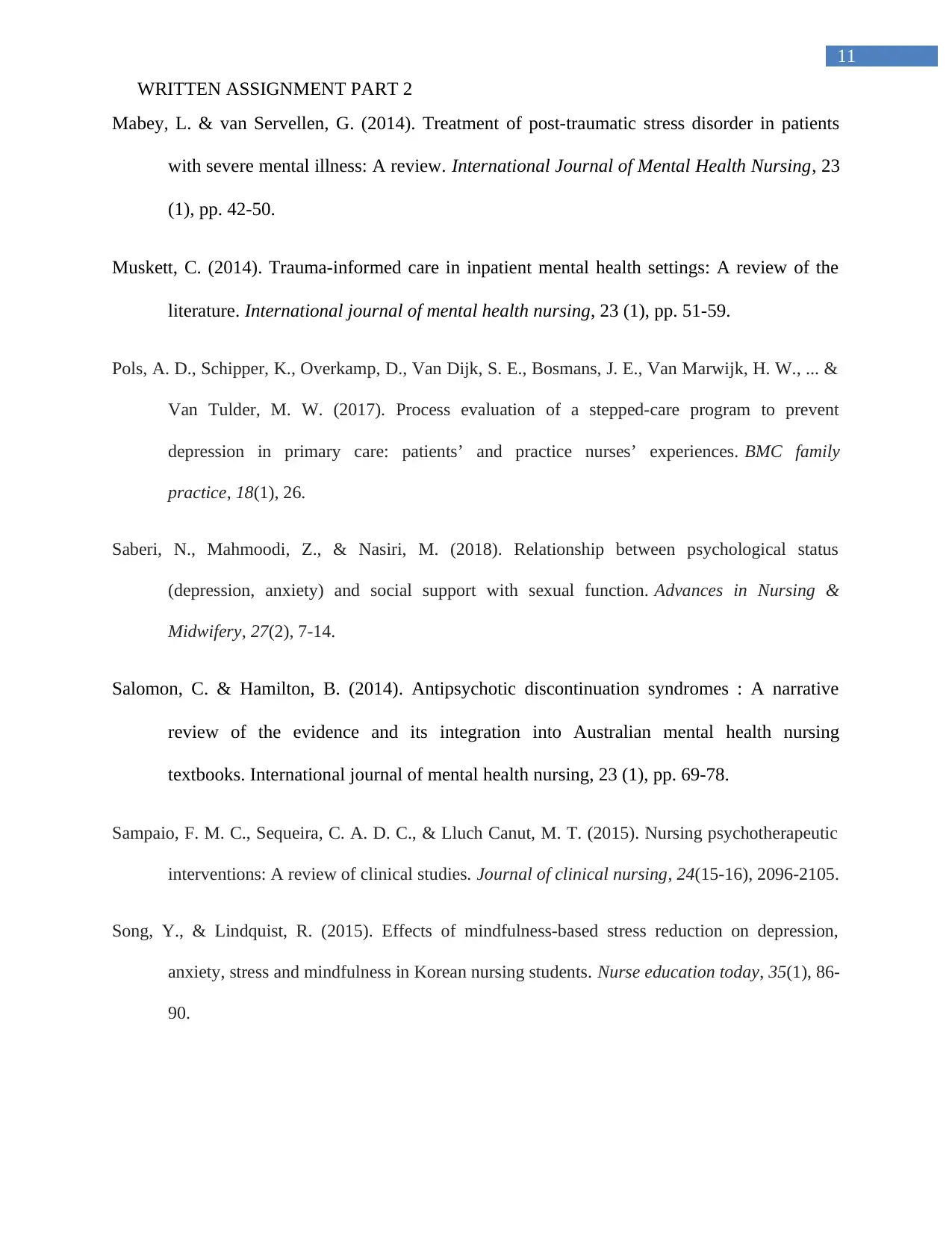
11
WRITTEN ASSIGNMENT PART 2
Mabey, L. & van Servellen, G. (2014). Treatment of post-traumatic stress disorder in patients
with severe mental illness: A review. International Journal of Mental Health Nursing, 23
(1), pp. 42-50.
Muskett, C. (2014). Trauma-informed care in inpatient mental health settings: A review of the
literature. International journal of mental health nursing, 23 (1), pp. 51-59.
Pols, A. D., Schipper, K., Overkamp, D., Van Dijk, S. E., Bosmans, J. E., Van Marwijk, H. W., ... &
Van Tulder, M. W. (2017). Process evaluation of a stepped-care program to prevent
depression in primary care: patients’ and practice nurses’ experiences. BMC family
practice, 18(1), 26.
Saberi, N., Mahmoodi, Z., & Nasiri, M. (2018). Relationship between psychological status
(depression, anxiety) and social support with sexual function. Advances in Nursing &
Midwifery, 27(2), 7-14.
Salomon, C. & Hamilton, B. (2014). Antipsychotic discontinuation syndromes : A narrative
review of the evidence and its integration into Australian mental health nursing
textbooks. International journal of mental health nursing, 23 (1), pp. 69-78.
Sampaio, F. M. C., Sequeira, C. A. D. C., & Lluch Canut, M. T. (2015). Nursing psychotherapeutic
interventions: A review of clinical studies. Journal of clinical nursing, 24(15-16), 2096-2105.
Song, Y., & Lindquist, R. (2015). Effects of mindfulness-based stress reduction on depression,
anxiety, stress and mindfulness in Korean nursing students. Nurse education today, 35(1), 86-
90.
WRITTEN ASSIGNMENT PART 2
Mabey, L. & van Servellen, G. (2014). Treatment of post-traumatic stress disorder in patients
with severe mental illness: A review. International Journal of Mental Health Nursing, 23
(1), pp. 42-50.
Muskett, C. (2014). Trauma-informed care in inpatient mental health settings: A review of the
literature. International journal of mental health nursing, 23 (1), pp. 51-59.
Pols, A. D., Schipper, K., Overkamp, D., Van Dijk, S. E., Bosmans, J. E., Van Marwijk, H. W., ... &
Van Tulder, M. W. (2017). Process evaluation of a stepped-care program to prevent
depression in primary care: patients’ and practice nurses’ experiences. BMC family
practice, 18(1), 26.
Saberi, N., Mahmoodi, Z., & Nasiri, M. (2018). Relationship between psychological status
(depression, anxiety) and social support with sexual function. Advances in Nursing &
Midwifery, 27(2), 7-14.
Salomon, C. & Hamilton, B. (2014). Antipsychotic discontinuation syndromes : A narrative
review of the evidence and its integration into Australian mental health nursing
textbooks. International journal of mental health nursing, 23 (1), pp. 69-78.
Sampaio, F. M. C., Sequeira, C. A. D. C., & Lluch Canut, M. T. (2015). Nursing psychotherapeutic
interventions: A review of clinical studies. Journal of clinical nursing, 24(15-16), 2096-2105.
Song, Y., & Lindquist, R. (2015). Effects of mindfulness-based stress reduction on depression,
anxiety, stress and mindfulness in Korean nursing students. Nurse education today, 35(1), 86-
90.
⊘ This is a preview!⊘
Do you want full access?
Subscribe today to unlock all pages.

Trusted by 1+ million students worldwide
1 out of 13
Related Documents
Your All-in-One AI-Powered Toolkit for Academic Success.
+13062052269
info@desklib.com
Available 24*7 on WhatsApp / Email
![[object Object]](/_next/static/media/star-bottom.7253800d.svg)
Unlock your academic potential
Copyright © 2020–2026 A2Z Services. All Rights Reserved. Developed and managed by ZUCOL.





